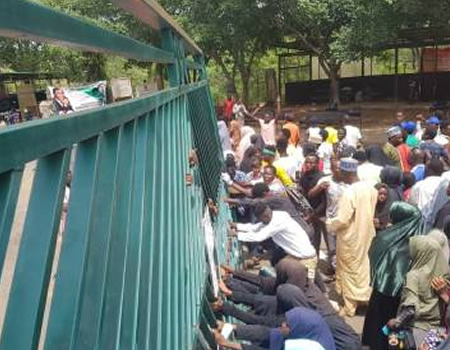The duty of the police is to maintain law and order and protect lives and properties. In discharging the duty, the legislature and the judiciary have always provided enabling laws for the discharge of this onerous duty.
However, recently the table has turned. The table turned because events have shown that there is a conspiracy to emasculate the police to the advantage of lawbreakers.
Before now, for a group of people to embark on any procession that is likely to affect the freedom and business of members of the public, they must apply to the police to enable the police plan, monitor and prevent hoodlums from hijacking such protests.
Recently someone sat in the hallowed chamber and out of pent-up anger, against the police gave a judgment that I regard as “unjurisprudential”, that is, he did not allow prudence to guide his lawmaking and delivered an anti-society judgment and amended the public act that had helped the police to maintain law and order over the years and thereby ensuring orderly society; pronouncing that no one needs police permit to embark on public procession and protests. The amendment is to the effect that freedom has no limit and therefore no one needs police permit in order to embark on police procession.
Another judge that considered the probable consequences of such ‘unjurisprudential’ judgment gave a contrary judgment. The two judgments are now being applied according to the whims and caprices of the actors as it suits them. The victims of this potential source of conflict created by the legislature and the judiciary in many cases are policemen. Only God fights for the police in Nigeria. They are the underdogs that can be insulted, brutalised, killed without the report of the investigations being made known to the public.
Two political parties have been found and seen to confront each other when their processions were planned for the same route resulting in mayhem. No one calls the police when rice and stew are being consumed but they must be there when bottles are being hurled at each other.
Legislation should be objective, passive and dispassionate. Law should only activate and energize itself when stepped upon and not aimed at a particular person or group but aimed at identified mischief. Conspiracy against the police will not help the society move forward as it affects law and order with its ripple effect.
The two major lawmaking institutions are the judiciary and the legislature. The law the legislature makes and the judgment of the court which often serves as precedent to guide other judgments can make or mar police operations.
These judgments are contrary to natural law because even among the ants that man regards as miniature creature, there is law and order. Watch how the ants line up in their colony and move in procession in an orderly and controlled manner while at the same time providing security for their workers that move in an organised linear order.
What we have witnessed in the Shi’ites attack on The National Assembly is just one of the ripple effects of conspiracy of the legislature and some unpatriotic member of the judiciary emasculate the police, render them impotent and irrelevant.
The police too have their own share of the blame as they failed to salvage their situation. Sometimes if prudence and foresight is not employed in legislation we end up creating more problems for the society than the mischief we hope to cure.
The question is, is it now better for a player to be a referee in a game of football? Out of conspiracy and prejudice another monster has been created.
There is need to deeply ponder and examine the probable consequences of our bills before passing them into law.
Abayomi Akeremale,
Retired Commissioner of Police






